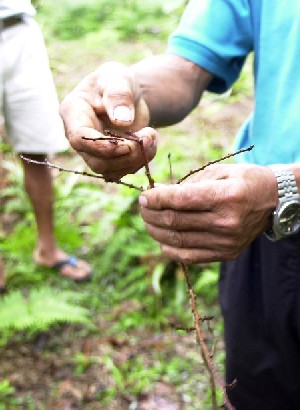Feature:
Measure
to
Make
Drug
Czar
Research
"Frankenstein
Fungus"
to
Destroy
Drug
Crops
Heads
to
the
Senate
4/7/06
Buried within the Office of National Drug Control Policy (ONDCP) Reauthorization Act about to be considered by the Senate is a provision that would order ONDCP, the drug czar's office, to revive already-shelved research into the use of toxic fungal mycoherbicides to eradicate drug crops in places like Colombia and Afghanistan. Authored by Rep. Dan Burton (R-IN), head of the House Government Operations Committee and championed by leading drug warrior Rep. Mark Souder (R-IN), the provision passed the House last July. "We spend millions of dollars every year on counter-narcotic efforts, including drug crop eradication and interdiction, especially in our joint efforts in Colombia, Afghanistan, and elsewhere, yet the flow of illegal and lethal narcotics continues to be a major problem in our country," said Burton in a news release crowing about the measure. "The advent of mycoherbicides and other counter-narcotic alternatives offers us the possibility to cut off the source of these drugs literally at their roots."
"If proven to be successful, mycoherbicide could revolutionize our drug eradication efforts," said Souder. "Mycoherbicide research needs to be investigated, and we need to begin testing it in the field. The potential benefit of these fungi is tremendous. My Hoosier colleague should be commended for advancing this initiative, and I'm pleased that his amendment was adopted into the bill." If the amendment remains intact during the rest of the appropriations process, the Burton provision would require the drug czar to present to Congress within 90 days a plan of action for a review of the science of mycoherbicides as a means of destroying drug crops. It also calls for controlled scientific testing of mycoherbicides in a major drug producing nation. The provision passed the House despite an almost universal rejection of mycoherbicide experimentation by federal government agencies -- including the drug czar's office -- as well as widespread fears about the unintended consequences of any use of mycoherbicides in an effort to destroy coca or opium fields. Mycoherbicides are literally fungal plant-killers, small chemical factories engineered to destroy specified target plant populations. But critics, some in surprising places, say they could get out of control. In response to a proposal by anti-drug officials in Florida to use mycoherbicides there, the head of the Florida Department of Environmental Protection, David Struhs, addressed the dangers of mycoherbicides like fusarium in a letter to then state drug czar Jim McDonough: "Fusarium species are capable of evolving rapidly. Mutagenicity is by far the most disturbing factor in attempting to use a Fusarium species as a bioherbicide. It is difficult, if not impossible to control the spread of Fusarium species. The mutated fungi can cause disease in large numbers of crops, including tomatoes, peppers, flowers, corn and vines and are normally considered a threat to farmers as a pest, rather than as a pesticide... Fusarium species are more active in warm soils and can stay resident in the soil for years. Their longevity and enhanced activity under Florida conditions are of concern, as this could lead to an increased risk of mutagenicity." Now, with the Senate about to consider the ONDCP Reauthorization Act, opponents of the provision led by the Drug Policy Alliance (DPA) are gearing up to kill it. "The Senate will either take up the House bill or introduce its own bill," said DPA national affairs director Bill Piper. "If they introduce their own bill, we want to ensure they don't include the mycoherbicide provision, and if they adopt the House bill, we want this taken out in conference committee," he told DRCNet. While House proponents of the measure are asking for more research, Piper said that wasn't necessary. "This has already been studied to death," he said. "Scientists know this is not a good idea. The idea of releasing something like this in the wild, whether you're talking about Afghanistan or Colombia, is frightening. There is no way you can control it, and while it may or may not wipe out drug crops, it will certainly wipe out legal crops and harm animal and human life as well."
As part of the campaign to defeat the bill, DPA released this week a report by journalist and mycoherbicide researcher Jeremy Bigwood that tracks 30 years of research and rising concern about the dangers of mycoherbicides. According to the report, "Repeating Mistakes of the Past: Another Mycoherbicide Research Bill," the use of mycoherbicides has been rejected by every US government agency that has studied the issue, including the Department of Agriculture, the State Department, the CIA and the DEA. And not only are they toxic and dangerous, they are not effective against resistant coca and poppy strains. The use of mycoherbicides would be viewed globally as an act of biological warfare, said Bigwood. "If it becomes law, this bill will have very deleterious consequences for the United States and its relations with the rest of the world," he said. "The proposed unilateral deployment of mycoherbicides by the United States in foreign countries would be considered a violation of the Biological Weapons Convention, and would likely increase support for the insurgencies in Colombia and Afghanistan. We must hold ourselves accountable to the same standards regarding biological weaponry as we hold our allies and enemies alike." Similar concerns led the Clinton administration to reject the use of mycoherbicides in Colombia even after Congress authorized spending $23 million for them in 1998. After the National Security Council expressed concern over possible responses to the use of mycoherbicides, Clinton waived their use. "Essentially the entire US government has closed ranks against using mycoherbicides," Bigwood told DRCNet. "All of the research suggests it would be extremely dangerous to use them. They are toxic, and they are non-specific, and they mutate. They are little chemical factories that produce toxic chemicals, and they can mutate, they can attack other crops, and they can attack humans. Right now, for instance, we have a problem with fusarium oxysporum eating the eyes of contact lens wearers. When I go to Colombia and talk to the people who spray glyphosate, people who are walking around in that stuff all day long, none of these people will go near mycoherbicides, not the Americans and not the Colombians." "The mycoherbicide cheering section is blind to the dangers -- both scientific and political -- of resorting to them," said Bigwood. "This is essentially biowarfare, and Burton and his friends are trying to force the executive branch to do this against its will. The US government doesn't want to go with this. Just think about how the FARC in Colombia could use this as a propaganda coup; the blowback would be instant and dramatic. Likewise, if they threaten to use this in Afghanistan, that would be really bad news. The Taliban doesn't have much sympathy in the Western world, but start spraying with that stuff and that will quickly change," he said. "We hope the Senate will thoroughly consider the potentially disastrous effects of mycoherbicide spraying, and as they draft their version of the bill that they remove the mycoherbicide language," Bigwood said. "We urge the Senate to reject any bill requiring that the US government retest mycoherbicides for drug crop elimination, either in the United States or in other countries." Now, said Piper, it is time to make sure the Senate heeds the warnings. "We are hoping to generate some media attention on this, and are preparing to work on the Hill to ensure this measure is either stripped from the Senate's version or killed in conference committee," he said.
|


